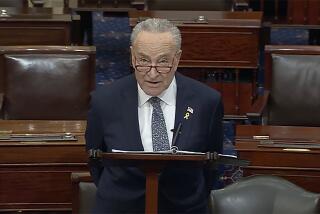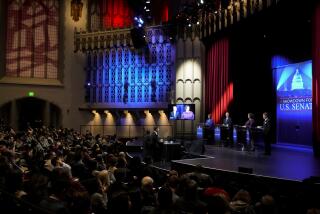Peres, Shamir Clash in Israeli Election Debate
- Share via
RAMAT GAN, Israel — Gambling that renewed hopes for Middle East peace talks can propel him into the prime minister’s office, Foreign Minister and Labor Alignment leader Shimon Peres lashed out aggressively at his archrival, current Prime Minister Yitzhak Shamir, during a half-hour television debate Sunday that marked the homestretch of Israel’s election campaign.
While the public’s verdict on the late-night face-off will not be clear for at least a day, scores of Israeli and foreign journalists invited to watch the taping earlier Sunday gave the edge to Peres.
And even members of Shamir’s own Likud Bloc indirectly acknowledged the Labor leader’s strong performance by couching praise of their candidate in terms of his relative lack of preparation and his reputation as an inferior debater.
Neck-and-Neck Race
According to most polls, the two big parties are running neck and neck in the race to win enough of a plurality in Nov. 1 parliamentary elections to form the next Israeli government. They have been joined in an uneasy “national unity” coalition for the last 50 months, after inconclusive elections in 1984. How much the debate affects the balloting may never be known, but it occurs at a time when Arab moves appear to be lending the Labor campaign some new momentum.
Jordan’s King Hussein, Egyptian President Hosni Mubarak and Palestine Liberation Organization leader Yasser Arafat held a surprise weekend summit at Aqaba, Jordan, in an apparent effort to coordinate positions on peace talks.
“We want the Israeli voter, whether Arab or Jew, to understand where his specific interest lies,” explained Osama Baz, Mubarak’s foreign affairs adviser. “Let him know when he casts his vote that there is an Arab partner ready for negotiations.”
The summit followed an ABC television interview last week in which Hussein described Peres’ proposals for an international Mideast peace conference as “very encouraging” and warned that a victory by the rightist Likud could bring “absolute disaster” to the region.
Simultaneously, the latest survey by the Israel Institute of Applied Social Research, published by the English-language Jerusalem Post newspaper Sunday, showed Labor “gaining a slight advantage over Likud.” The Post cautioned that the lead may be “ephemeral” but added that “for the first time we are seeing a possible departure from the tie between the two major parties.”
There has been a widespread perception here that whatever the polls show, Likud has profited from Israeli frustration over the Palestinian unrest that has paralyzed the occupied West Bank and Gaza Strip for much of the last 10 months.
Referring to the acknowledged role of Peres aides in stage-managing the ABC interview with Hussein, Shamir reiterated charges Sunday that it was an election ploy. “To bring an Arab ruler into the Israeli election campaign is a blunt interference which has no precedent, and I think the people should condemn it,” he said.
Over the weekend, a Shamir aide implied that Labor had had a hand in the Aqaba summit as well and that this, too, was a misleading effort to sway voters by falsely suggesting that Jordan is ready to make peace with Israel on its own and the Palestinians’ behalf.
The charge that Labor is cozying up to the Arabs in violation of the national interest is the potentially explosive downside in the Peres strategy. Even Knesset member Haim Ramon, a Laborite, who played the role of Shamir in four practice debates for Peres, said after the confrontation: “I think Shamir missed his chance” to capitalize on Labor’s role in brokering the Hussein interview. “When I played Shamir, I punched with this issue much stronger.”
Defending Moves
Peres was forceful in defending his moves during the debate, looking directly into the TV cameras while his rival, as instructed beforehand, addressed the moderator. At one point Peres brandished a copy of the Likud platform while challenging Shamir’s stated readiness to negotiate.
“To recruit an Arab country for peace is a sin?” the Labor leader asked rhetorically. “Or is it an achievement? I wish we could have recruited all the countries for peace, with Ted Koppel or without Ted Koppel,” he added, referring to the host of the ABC “Nightline” program on which Hussein was interviewed.
Commented Peres: “Every evening I hear on TV from the Likud that we’re selling the country, that we’re returning to 1967 borders (before Israeli troops captured the West Bank and Gaza Strip). What kind of talk is this? How does the Likud dare all the time to spread such slander and such deceptions among the people. . . . Did (Israeli founding father, David) Ben-Gurion sell the state when he decided to establish a Jewish state on part of the Land of Israel? This is what you have to say? This is how you talk to the people?”
‘Give Me a Chance’
In an emotional plea for national support, the Labor leader added: “I’m not saying that there will be peace tomorrow, or peace immediately. I am also not willing to pay any price for peace. I’m just saying, if you give me a chance we can begin negotiations. The whole picture in the Middle East will change. We will not only talk war and make war and have an arms race. We could devote ourselves to the basic things of our life--economy, education, health, preparing jobs for the younger generation. There is a big chance.”
Countered Shamir: “An international conference as a beginning (of negotiations) is the beginning of defeat, of Israeli surrender . . . because . . . all the Arabs that are for it know that such a conference will decide upon an Israeli withdrawal to 1967 borders at least, and on the establishment of a Palestinian state. Therefore, this is not a chance for peace, but the contrary.”
Shamir seemed at his strongest when lashing out at Labor’s economic policies, while Peres chose--even when asked specifically about his economic plans--to refer to his rival’s comments on the peace process. Speaking last after winning a pre-debate coin toss, Shamir took a final swipe at Labor’s record during the last four years by echoing the late American civil rights leader, the Rev. Martin Luther King Jr.
‘A National Necessity’
“I had a dream,” the Likud leader said of his call before the 1984 elections for a national unity coalition. “National unity for me is not just a convenience. It is a national necessity.” However, he said, Labor was “not loyal; (it) broke agreements, and that’s why, to my great sorrow, unity was shattered. . . . This time I cannot come and say: ‘Let’s repeat the experiment.’ . . . I will call upon the public today to give power to the Likud.”
More to Read
Sign up for Essential California
The most important California stories and recommendations in your inbox every morning.
You may occasionally receive promotional content from the Los Angeles Times.













